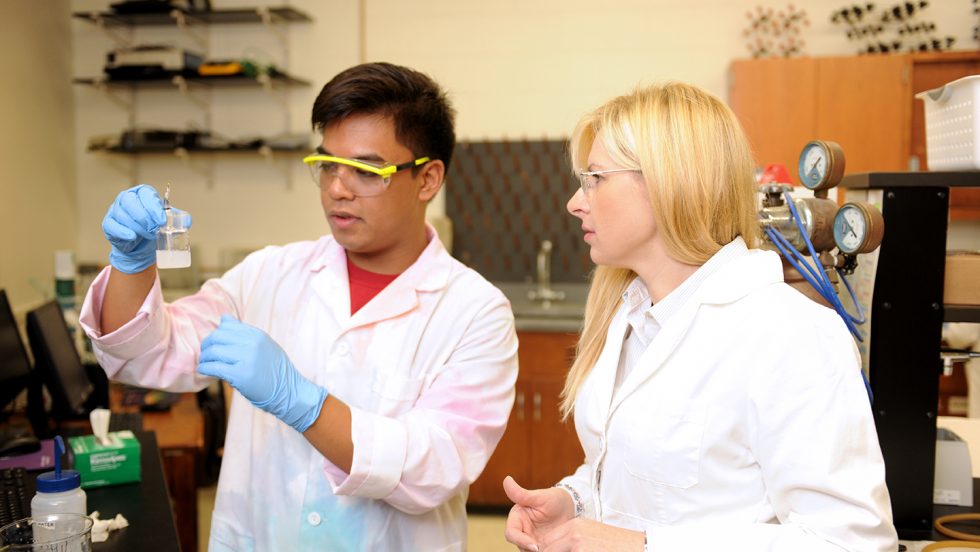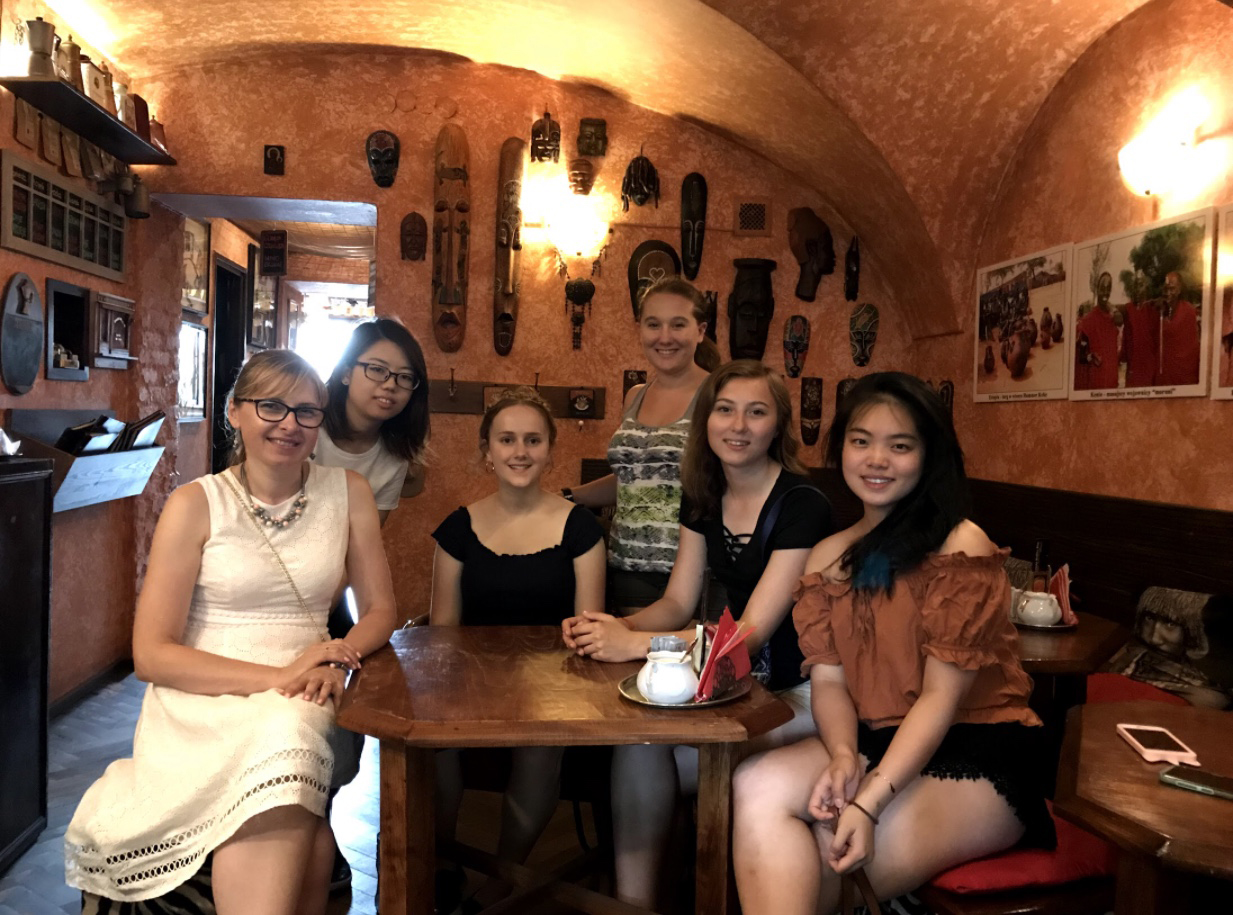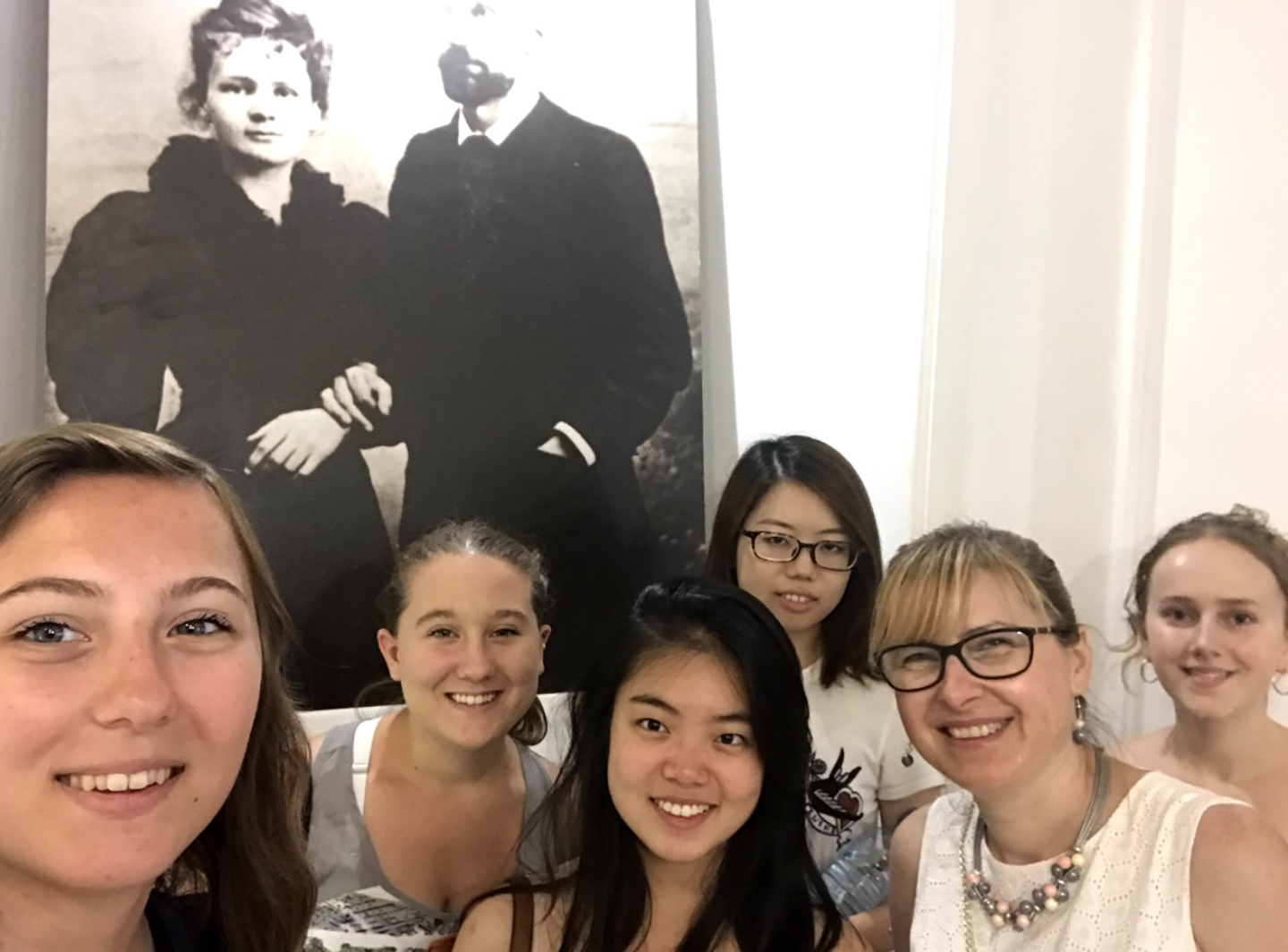
After a year and a half of COVID restrictions, Adelphi University celebrated the new academic year with the announcement of a major grant awarded to the College of Arts and Sciences.
The $300,000 award from the National Science Foundation (NSF) funds six members of the Adelphi community to work with Justyna Widera-Kalinowska, PhD, associate professor of chemistry, at the University of Warsaw in Poland. The collaborative research project creates a distinctive three-year opportunity for 18 students in total, starting next summer.

Coffee and science discussion during the Summer 2018 National Science Foundation International Research Experiences for Students research abroad program in Warsaw, Poland. Department of Chemistry students (left to right) : Stephanie Dulovic, Marisa McLeod, Kelly Zhu, Momoka Nagamine and Sophia Casto and (far left) Justyna Widera-Kalinowska, PhD, associate professor of chemistry.
For 16 years, Dr. Widera-Kalinowska has inspired and motivated her chemistry students in the Adelphi community with her passionate and positive outlook toward the essential subject. “Chemistry is powerful,” she said.
A year of sabbatical and the pandemic motivated her to write her NSF proposal. Dr. Widera-Kalinowsk had previously sought private donations and sponsors to support her studies. However, her determination to provide more student support pushed her to seek a more extensive grant. She was surprised and overjoyed seeing her proposal accepted.
Semiconductors Versus Climate Change
The Polish native completed her education at the University of Warsaw in her native country and she has maintained professional connections with former professors and colleagues at her alma mater. What began as a limited grant, bringing one doctoral student to Long Island, has grown. Now multiple Adelphi students have been given the opportunity to study material science in this historic Polish city. “Experience and practice are the best ways to flourish in science,” she said. “Many people think they are not good in science but that could be because they didn’t have the chance to practice. Opportunities like this can show them that this is meant for them.”
Dr. Widera-Kalinowska and her students will be working to create new materials that have to be engineered with special properties. Those materials could have unique properties when made by undergoing specific procedures, known as the nanoscale.
To be able to do this process continuously, they will have to be able to synthesize the materials in the nanoscale in such a precise way, thus cutting the same size and design of the material every time. They work with not just one material, but multiple materials to create an intelligently designed hybrid or composite of intercalating layers.
This design the scientists will be working on must be conducted minutely before it is made. Then they will have to be able to synthesize it repeatedly, following the same process. Once the material with desired properties is synthesized, it will be tested to ensure accuracy.
The properties that are expected from the materials are called semiconductors, as they must be able to conduct electricity, including that emitted by solar light. Capturing solar light efficiently enables them to produce substantial amounts of electrical energy.
Harnessing Solar Energy to Clean Polluted Water
This electrical energy can be created in two different ways. The first method is storing energy, known as photovoltaics. This is commonly used to create batteries. The second method is to use the energy from other forms of energetic resources. Dr. Widera-Kalinowska and her students will be using water to produce hydrogen gas. The harnessed solar energy will be used by the research group to create a novel green cleaning method by catalyzing the reactions caused by the degradation of harmful pollutants found in wastewater.

Visit to Marie Curie-Sklodowska’s birthplace and the Marie Curie-Sklodowska Museum. Curie-Sklodowska was the recipient of two Nobel Prizes in physics and chemistry. Department of Chemistry students (left to right) Stephanie Dulovic, Marisa McLeod, Kelly Zhu, Momoka Nagamine and Sophia Casto and Justyna Widera-Kalinowska, PhD, associate professor of chemistry, visited this museum during the summer abroad research visit at the University of Warsaw in Warsaw, Poland.
Moreover, this international collaboration will focus on developing visible-light-responsive nanohybrids for photocatalysis and photoelectrochemical solar energy conversion.
The goal is to create greener energy, which is crucial as the climate crisis continues to worsen. The rigorous course of study requires students who must be strong intellectually as well as able to accept the challenges of living abroad on top of the demanding work that awaits them.
“It is not easy going to another country with another culture and working in the lab. It is a lot for students,” said Dr. Widera-Kalinowska.
How Does Faculty-Mentored Research Change Lives?
Vincent Wang, PhD, dean of the College of the Arts and Sciences (CAS), says he is excited to learn of this initiative.
“Dr. Widera-Kalinowska’s NSF grant offers Adelphi students unparalleled opportunities for scientific inquiry, collaboration and cultural exploration,” he said. “Such opportunities exemplify the so-called high-impact practices. Science is increasingly international, as tackling pressing challenges facing mankind, such as climate change and epidemics, requires cross-national collaboration. This grant nicely embeds this feature, thanks to Dr. Widera-Kalinowska’s track record and her network. Faculty-mentored research is an effective way for undergraduate students to learn.”
The grant will also give students “many intangibles,” Dr. Wang said, such as living in a different society and learning a foreign language. “These push students’ boundaries for growth and development. I hope this grant inspires more CAS faculty and students to think of ways to enrich their Adelphi educational experience.”
Alexander Aragon ’18 said his experience working with Dr. Widera-Kalinowska’s lab changed his career path.
“By joining Dr. Widera-Kalinowska’s research group and then subsequently going to Poland as part of the NSF IRES (International Research Experiences for Students) grant, I was able to broaden my horizons culturally through exploring Poland while working at the University of Warsaw,” he said. “My experiences conducting this research allowed me to find my true passion for semiconductor research while working on hybrid materials for the degradation of organic pollutants through photocatalysis.
“The exposure to the vast world of science and how we do it from different areas in the world through collaboration has led me to pursue a long-term career in the sciences, and allowed me to get into the PhD program at Wake Forest University, where I am continuing to do semiconductor research for the treatment of wastewater,” Aragon added. “My long-term goal is to have my own research lab in the future.”
As Dr. Widera-Kalinowska said, “Chemistry when you spell it out is chem-is-try.”